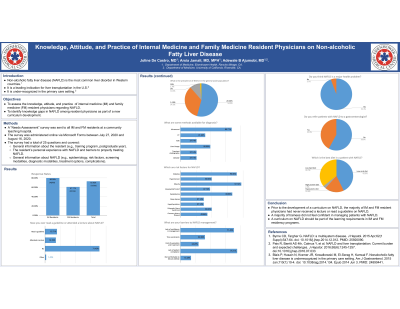Back


Poster Session A - Sunday Afternoon
Category: Liver
A0500 - Knowledge, Attitude, and Practice of Internal Medicine and Family Medicine Resident Physicians on Non-Alcoholic Fatty Liver Disease
Sunday, October 23, 2022
5:00 PM – 7:00 PM ET
Location: Crown Ballroom

Has Audio
- JD
Joline De Castro, MD
Eisenhower Medical Center
Rancho Mirage, CA
Presenting Author(s)
Joline De Castro, MD, Arsia Jamali, MD, MPH, Adewale Ajumobi, MD, MBA, FACG
Eisenhower Medical Center, Rancho Mirage, CA
Introduction: Non-alcoholic fatty liver disease (NAFLD) is the most common liver disorder in Western countries and a leading indication for liver transplantation in the United States. Despite its high burden on public health, it is under-recognized in the primary care setting. The aim of the study is to assess the knowledge, attitude, and practice of internal medicine (IM) and family medicine (FM) resident physicians on NAFLD.
Methods: A questionnaire about NAFLD was sent to all residents of the IM and FM programs at a community teaching hospital. It was administered online via Microsoft Forms between July 27, 2020 and August 16, 2020. The questionnaire had a total of 25 questions.
Results: A total of 48 out of 60 IM residents and 22 out of 36 FM residents responded to the survey, representing a total response rate of 72.92%. 62.5% of IM residents and 72.3% of FM residents had not attended a lecture or reviewed guidelines on NAFLD. Majority (54.3%) of the residents believed that the prevalence of NAFLD in the general population was 20-40%. Majority of the participants acknowledged that patients with obesity (97.14%), diabetes (90%) and dyslipidemia (82.86%) are at the highest risks for development of NAFLD. 85.71% of the residents were aware of ultrasound examination as diagnostic modality for NAFLD; however, only 50% and 27.14% appreciated the role of liver biopsy and transient elastography as other diagnostic modalities, respectively. 72.9% of IM residents and 86.3% of FM residents did not feel confident in managing NAFLD. Although 94.3% of residents believed that NAFLD is a major health problem, only 42% expressed that they refer individuals with NAFLD to a gastroenterologist or hepatologist. While the majority of residents identified dietary modifications and physical activity as therapeutic approaches for NAFLD, only 20.8% of IM residents and 18.6% of FM residents knew that a hypocaloric diet is the preferred diet.
Discussion: The majority of IM and FM residents do not feel confident in managing patients with NAFLD. A curriculum on NAFLD should be part of the learning requirements for trainees in IM and FM residency programs.
Disclosures:
Joline De Castro, MD, Arsia Jamali, MD, MPH, Adewale Ajumobi, MD, MBA, FACG. A0500 - Knowledge, Attitude, and Practice of Internal Medicine and Family Medicine Resident Physicians on Non-Alcoholic Fatty Liver Disease, ACG 2022 Annual Scientific Meeting Abstracts. Charlotte, NC: American College of Gastroenterology.
Eisenhower Medical Center, Rancho Mirage, CA
Introduction: Non-alcoholic fatty liver disease (NAFLD) is the most common liver disorder in Western countries and a leading indication for liver transplantation in the United States. Despite its high burden on public health, it is under-recognized in the primary care setting. The aim of the study is to assess the knowledge, attitude, and practice of internal medicine (IM) and family medicine (FM) resident physicians on NAFLD.
Methods: A questionnaire about NAFLD was sent to all residents of the IM and FM programs at a community teaching hospital. It was administered online via Microsoft Forms between July 27, 2020 and August 16, 2020. The questionnaire had a total of 25 questions.
Results: A total of 48 out of 60 IM residents and 22 out of 36 FM residents responded to the survey, representing a total response rate of 72.92%. 62.5% of IM residents and 72.3% of FM residents had not attended a lecture or reviewed guidelines on NAFLD. Majority (54.3%) of the residents believed that the prevalence of NAFLD in the general population was 20-40%. Majority of the participants acknowledged that patients with obesity (97.14%), diabetes (90%) and dyslipidemia (82.86%) are at the highest risks for development of NAFLD. 85.71% of the residents were aware of ultrasound examination as diagnostic modality for NAFLD; however, only 50% and 27.14% appreciated the role of liver biopsy and transient elastography as other diagnostic modalities, respectively. 72.9% of IM residents and 86.3% of FM residents did not feel confident in managing NAFLD. Although 94.3% of residents believed that NAFLD is a major health problem, only 42% expressed that they refer individuals with NAFLD to a gastroenterologist or hepatologist. While the majority of residents identified dietary modifications and physical activity as therapeutic approaches for NAFLD, only 20.8% of IM residents and 18.6% of FM residents knew that a hypocaloric diet is the preferred diet.
Discussion: The majority of IM and FM residents do not feel confident in managing patients with NAFLD. A curriculum on NAFLD should be part of the learning requirements for trainees in IM and FM residency programs.
Disclosures:
Joline De Castro indicated no relevant financial relationships.
Arsia Jamali indicated no relevant financial relationships.
Adewale Ajumobi indicated no relevant financial relationships.
Joline De Castro, MD, Arsia Jamali, MD, MPH, Adewale Ajumobi, MD, MBA, FACG. A0500 - Knowledge, Attitude, and Practice of Internal Medicine and Family Medicine Resident Physicians on Non-Alcoholic Fatty Liver Disease, ACG 2022 Annual Scientific Meeting Abstracts. Charlotte, NC: American College of Gastroenterology.
